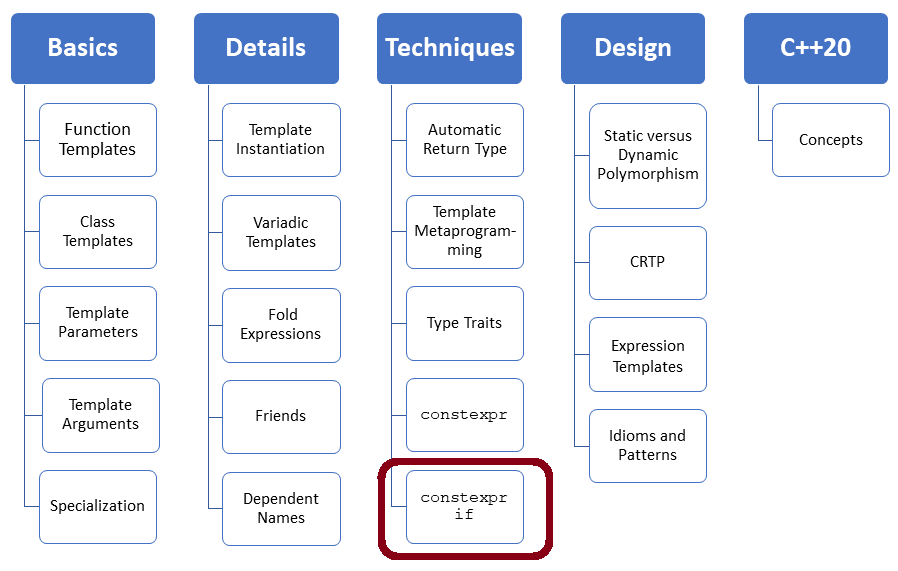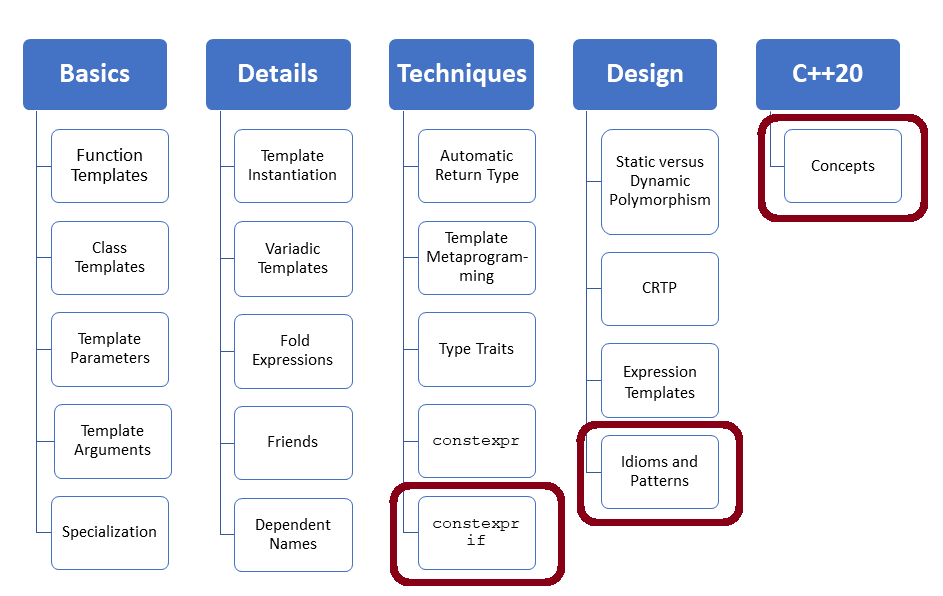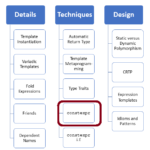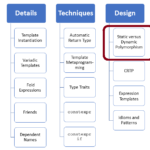constexpr if
In today’s post, I want to introduce an exciting C++17 feature: constexpr if. constexpr if enables it to compile source code conditionally and can be used for nice tricks at compile time.

Introducing constexpr if is straightforward.
template <typename T> auto getValue(T t) { if constexpr (std::is_pointer_v<T>) // (1) return *t; // deduces return type to int for T = int* else // (2) return t; // deduces return type to int for T = int }
The code snippet shows one exciting fact about constexpr if: Although it is called constexpr if, it is used as if constexpr: if constexpr (std::is_pointer_v<T>).
If T is a pointer, the if branch in line (1) will be compiled. If not, the else branch in line (2). Two points are important to mention. The function getValue has two different return types, and both branches of the if statement have to be valid.
The expression in constexpr if has to be a compile-time predicate. A compile time predicate is a function that returns a boolean and runs at compile time. I used in the code snippet a function from the type-traits library. Alternatively, in C++20, you can use a concept. Here is the equivalent example using the concept std::integral:
 Modernes C++ Mentoring
Modernes C++ Mentoring
Do you want to stay informed: Subscribe.
template <typename T> auto get_value(T t) { if constexpr (std::integral<T>) // (1) return *t; // deduces return type to int for T = int* else // (2) return t; // deduces return type to int for T = int }
I see, the two code snippets are not so impressive. Let me continue with template metaprogramming.
Thanks to constexpr if, template metaprogramming is often easier to write and read.
Template Metaprogramming with constexpr if
Metaprogramming is programming on programs. C++ applies metaprogramming at compile time. It started in C++98 with template metaprogramming, was formalized in C++11 with the type-traits library, and since C++11 has steadily improved.
Here is the “Hello World” of template metaprogramming: calculating the factorial of a number:
// factorial.cpp #include <iostream> template <int N> // (2) struct Factorial{ static int const value = N * Factorial<N-1>::value; }; template <> // (3) struct Factorial<1>{ static int const value = 1; }; int main(){ std::cout << '\n'; std::cout << "Factorial<5>::value: " << Factorial<5>::value << '\n'; // (1) std::cout << "Factorial<10>::value: " << Factorial<10>::value << '\n'; // (4) std::cout << '\n'; }
The call factorial<5>::value (line 1) causes the instantiation of the primary or general template (line 2). During this instantiation, Factorial<4>::value will be instantiated. This recursion will end if the fully specialized class template Factorial<1> kicks in (line 3).
If you want to know more about template metaprogramming, read my previous posts:
- Template Metaprogramming – How it All Started
- Template Metaprogramming – How it Works
- Template Metaprogramming – Hybrid Programming
Let me rewrite the program using constexpr if:
// factorialConstexprIf.cpp template <int N> // (1) struct Factorial{ static int const value = N * Factorial<N-1>::value; }; template <> // (2) struct Factorial<1>{ static int const value = 1; }; template <int N> // (3) constexpr int factorial() { if constexpr (N >= 2) return N * factorial<N-1>(); else return N; } int main(){ static_assert(Factorial<5>::value == factorial<5>()); // (4) static_assert(Factorial<10>::value == factorial<10>()); // (4) }
The primary template of Factorial (line 1) becomes the if condition in the constexpr function factorial (line 3), and the full specialization of Factorial for 1 (line 2) becomes the else case in the constexpr function factorial (line 3). Of course, the class template Factorial and the constexpr function factorial return the same result and are executed at compile time (line 4). To make it short, I prefer the constexpr function using constexpr if because it reads almost such as a usual function.
Let’s do it once more. Here is the infamous Fibonacci function-based template metaprogramming (Fibonacci) and constexpr if (fibonacci).
// fibonacciConstexprIf.cpp template<int N> constexpr int fibonacci() { if constexpr (N>=2) return fibonacci<N-1>() + fibonacci<N-2>(); else return N; } template <int N> // (1) struct Fibonacci{ static int const value = Fibonacci<N-1>::value + Fibonacci<N-2>::value; }; template <> // (2) struct Fibonacci<1>{ static int const value = 1; }; template <> // (3) struct Fibonacci<0>{ static int const value = 0; }; int main() { static_assert(fibonacci<7>() == 13); static_assert(fibonacci<7>() == Fibonacci<7>::value); }
The constexpr function fibonacci is straightforward to read. The entire functionality is in one function body. In contrast, the template metaprogram Fibonacci requires three classes. The primary template (line 1) and the two full specializations for the values 1 and 0 (lines 2 and 3).
More Information about my Mentoring Program, “Fundamentals for C++ Professionals”
I created the platform for my new mentoring on https://www.modernescpp.org/. You can skip through each of the 28 lessons. I also presented the 6th lesson about move semantics and perfect forwarding in the post ‘More Information about my Mentoring Program “Fundamentals for C++ Professionals”‘. Here are the next steps before I start the mentoring program.
- Beginning of March: online information session about my mentoring program, where you can also ask your questions
- Middle of March: my mentoring program opens for registration
- April: registration for the mentoring program closes, and the mentoring program starts
If you want to stay informed, write an e-mail to info@ModernesCpp.de with the subject “Mentoring”. Write me also an e-mail if you need more information.
What’s Next?
Templates are a powerful tool and, therefore, provide new design choices. In my next post, I will write about static and dynamic polymorphism.
Thanks a lot to my Patreon Supporters: Matt Braun, Roman Postanciuc, Tobias Zindl, G Prvulovic, Reinhold Dröge, Abernitzke, Frank Grimm, Sakib, Broeserl, António Pina, Sergey Agafyin, Андрей Бурмистров, Jake, GS, Lawton Shoemake, Jozo Leko, John Breland, Venkat Nandam, Jose Francisco, Douglas Tinkham, Kuchlong Kuchlong, Robert Blanch, Truels Wissneth, Mario Luoni, Friedrich Huber, lennonli, Pramod Tikare Muralidhara, Peter Ware, Daniel Hufschläger, Alessandro Pezzato, Bob Perry, Satish Vangipuram, Andi Ireland, Richard Ohnemus, Michael Dunsky, Leo Goodstadt, John Wiederhirn, Yacob Cohen-Arazi, Florian Tischler, Robin Furness, Michael Young, Holger Detering, Bernd Mühlhaus, Stephen Kelley, Kyle Dean, Tusar Palauri, Juan Dent, George Liao, Daniel Ceperley, Jon T Hess, Stephen Totten, Wolfgang Fütterer, Matthias Grün, Ben Atakora, Ann Shatoff, Rob North, Bhavith C Achar, Marco Parri Empoli, Philipp Lenk, Charles-Jianye Chen, Keith Jeffery, Matt Godbolt, Honey Sukesan, bruce_lee_wayne, Silviu Ardelean, schnapper79, Seeker, and Sundareswaran Senthilvel.
Thanks, in particular, to Jon Hess, Lakshman, Christian Wittenhorst, Sherhy Pyton, Dendi Suhubdy, Sudhakar Belagurusamy, Richard Sargeant, Rusty Fleming, John Nebel, Mipko, Alicja Kaminska, Slavko Radman, and David Poole.
| My special thanks to Embarcadero |  |
| My special thanks to PVS-Studio |  |
| My special thanks to Tipi.build |  |
| My special thanks to Take Up Code |  |
| My special thanks to SHAVEDYAKS |  |
Modernes C++ GmbH
Modernes C++ Mentoring (English)
Rainer Grimm
Yalovastraße 20
72108 Rottenburg
Mail: schulung@ModernesCpp.de
Mentoring: www.ModernesCpp.org





Leave a Reply
Want to join the discussion?Feel free to contribute!